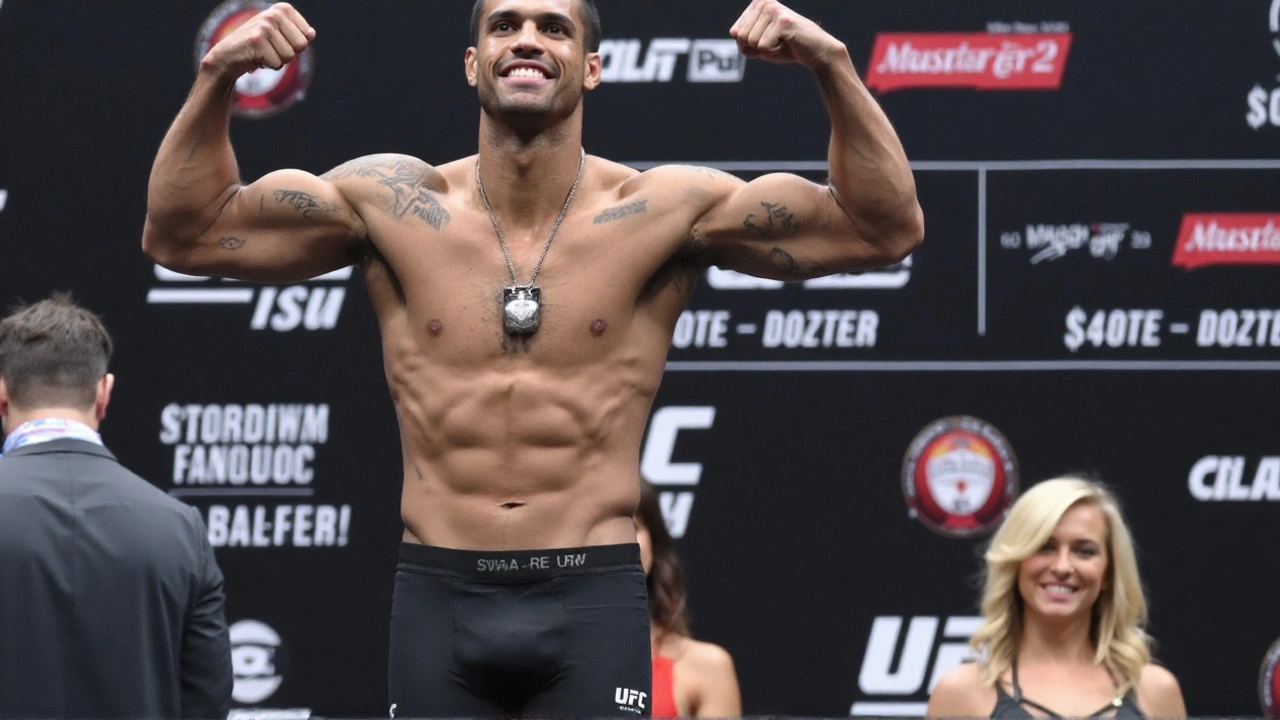When a Brazilian fighter thinks he’s about to headline a UFC show in Europe, you can feel the buzz in the gym and on social media. That was exactly the case for Thiago Santos in late 2017, when he was booked to face Poland’s Michal Materla at UFC Gdańsk on Oct. 28. The clash promised a classic striker‑versus‑ex‑KSW champ storyline, and fans in Gdańsk were already buzzing about a possible knockout festival.
What went wrong with the Gdańsk main event?
Santos rode a two‑fight win streak into the negotiations, dispatching Gerald Meerschaert and Jack Marshman via TKO. Those victories had him looking like a genuine contender in the middleweight ranks, especially after a 2016 loss to Eric Spicely that left a mark on his resume. On the other side of the cage, Materla arrived with a 24‑5 record and a celebrated knockout of UFC vet Rousimar Palhares. His UFC debut had been hyped as a chance to showcase the Polish fighter’s power to a global audience.
However, the drama that unfolded off the canvas proved more decisive than any fight camp. In December 2016, Materla was arrested in Szczecin alongside a group of alleged organized‑crime suspects. While the case never fully derailed his career, the legal cloud made it difficult for the UFC to secure the necessary visas and clearances for a high‑profile debut in Poland.
UFC officials, needing to keep the Gdańsk event intact, pivoted quickly. They replaced the Santos‑Materla headline with a more reliable draw: Donald “Cowboy” Cerrone versus rising welterweight Darren Till. The new headliner promised instant pay‑per‑view numbers, but it also meant Santos lost the spotlight he’d been eyeing.

Santos’ new fight in São Paulo and what it means
Instead of battling for the main‑event limelight in Gdańsk, Santos was reassigned to UFC São Paulo, where he would meet Sweden’s Jack Hermansson. The fight still offered a home‑crowd advantage—Brazilian fans love to rally behind their own—but it was a clear step down on the card hierarchy. Hermansson, a gritty grappler with a solid record, presented a stylistic puzzle that differed from the power‑punching showdown originally scheduled.
From a career‑development perspective, the shift carried several repercussions. First, the exposure gap: a main‑event slot invariably attracts more press, higher viewership, and better sponsor interest. Dropping to a supporting role meant fewer eyes on Santos’ performance, potentially slowing his ascent toward a title shot. Second, the psychological blow—fighters thrive on momentum, and having a marquee opportunity snatched away can dent confidence.
Nonetheless, Santos used the Sao Paulo platform to reaffirm his knockout credentials. He entered the Octagon with his striking arsenal honed, aiming to remind the division that he belongs in the conversation. Even if the bout didn’t carry the same promotional weight, a decisive win could still catapult him back into main‑event contention.
The episode underscores how volatile UFC scheduling can be. Legal issues, visa snags, injuries, or last‑minute promotional decisions can reshuffle entire cards in a matter of weeks. For fighters, adaptability becomes as crucial as skill; navigating these curveballs often defines the long‑term trajectory more than a single win or loss.
While Santos’ Gdańsk dream dissolved, the São Paulo fight offered a chance to rebound, rebuild fan interest, and keep the middleweight division buzzing. The next headline he earns will likely hinge on how convincingly he can finish Hermansson and whether the UFC decides his brand deserves another front‑row slot.

19 Responses
The logistical complexities that underpin UFC event planning often operate in a realm of high‑frequency oscillations, where macro‑level regulatory variables intersect with micro‑level athlete preparation cycles. When a fighter like Santos is earmarked for a marquee slot, the promotional algorithm reallocates resources across media, sponsorship pipelines, and broadcast contracts, creating a ripple effect that can amplify or attenuate a career trajectory. Visa procurement, in particular, functions as a stochastic gatekeeper; any deviation in documentation or geopolitical tension can cascade into a full‑scale card reconfiguration. In the case of the Gdańsk cancellation, the legal entanglements surrounding Materla introduced a risk vector that the UFC presumably evaluated as exceeding its tolerable threshold, prompting a substitution with a more market‑stable draw. This decision, while operationally sound, intersected with Santos’ personal momentum, effectively truncating his exposure to the European fanbase at a pivotal juncture. Exposure metrics-viewership numbers, social media impressions, and sponsor activation rates-are all bounded by cardinal placement on a fight card, and dropping to a supporting bout in São Paulo recalibrated those vectors downward. From a sports‑science perspective, such a shift can also perturb periodization plans; athletes tailor peak conditioning to coincide with the psychological boost of a main‑event spotlight, and an abrupt downgrade may introduce a cognitive dissonance that impacts performance output. Moreover, the promotional narrative surrounding a fighter is intimately tied to branding opportunities; a headline slot tends to catalyze ancillary content creation, from documentary features to interview circuits, which collectively deepen the athlete’s market penetration. The opportunity cost of missing the Gdańsk spotlight can therefore be quantified not only in immediate gate receipts but also in long‑term brand equity depreciation. Nonetheless, the adaptive capacity of a fighter-manifested through mental resilience and tactical flexibility-often determines whether the setback is a temporary dip or a permanent trough. Santos’ subsequent bout in São Paulo offered a platform to reassert his knockout efficacy, and a decisive finish could function as a corrective feedback loop, re‑elevating his algorithmic ranking within the UFC’s matchmaking calculus. In essence, the volatility of scheduling underscores the necessity for fighters to cultivate a multidimensional professional portfolio that is resilient to exogenous shocks. The interplay between administrative logistics and athletic execution remains a defining element of modern mixed‑martial‑arts careers. As the sport continues to globalize, athletes and managers alike must integrate risk mitigation strategies into contract negotiations, ensuring that visa contingencies and legal vetting are incorporated as core components of fight preparation. Ultimately, the Gdańsk episode serves as a case study in how macro‑level operational decisions reverberate through the micro‑level athlete ecosystem, shaping career narratives in ways that extend well beyond the confines of a single octagon encounter.
It's disheartening to see fighters' dreams shattered by bureaucratic red tape.
Reading about Santos’ situation really hits home for anyone who's put blood, sweat, and tears into a goal only to have it rerouted by forces beyond their control. The emotional toll of losing a headline slot can be significant, but his pivot to São Paulo shows a commendable level of professionalism and determination :) It also reminds us that athletes often have to stay mentally flexible, treating each fight as a new opportunity rather than a fixed destiny.
We all know the fight game isn’t just about punches it’s also about navigating a maze of paperwork and politics staying adaptable is key to longevity in the sport
Wow, what a roller‑coaster, huh?! The whole Gdańsk saga really highlights how unpredictable the MMA business can be, and it makes me wonder how many fighters have to re‑adjust their entire training camps on the fly!!! It’s a testament to the resilience required in this sport, for sure.
Santos lost a main‑event slot but still got a chance to prove himself.
Honestly, this whole visa fiasco is just another example of how the UFC’s global expansion is hampered by weak bureaucratic handling-if they want to dominate the market they need to lock down these logistics, not leave our fighters hanging.
Look, the so‑called “legal cloud” around Materla was blown out of proportion by PR spin; the UFC simply prioritized cash flow over a fair sporting narrative, and Santos got the short end of the stick.
Just another day in the fight world where paperwork beats power punches, huh
Thats a real bummer for Thiago but he can still brawl his way back into the limelight with a knockout in Sao Paulo keep grindin
It’s interesting to see how visa issues can reshape a whole card 😊 Do you think this might push the UFC to streamline their international licensing process?
The incident underscores the necessity for comprehensive contingency planning within event logistics.
Hey folks, if you’re curious about how fighters stay ready for sudden opponent changes, they usually keep a “game‑plan library” of strategies so they can switch gears on short notice 😎
Oh great, another plot twist-just what the fans needed, another night of paperwork drama while the real action sits idle in some bureaucratic limbo.
meh, seems like the UFC just shuffles names around like a deck of cards, nothing new.
From a metaphysical standpoint, the whole spectacle of fight scheduling serves as a microcosm of existential flux, where the individual’s desire for permanence is constantly subverted by the impermanence of institutional structures. One could argue that Santos’ displacement from Gdańsk epitomizes the Hegelian dialectic of thesis (the envisioned main‑event), antithesis (the bureaucratic impediment), and synthesis (the emergent São Paulo bout), thereby illustrating the perpetual transformation of martial identity within the commercial arena. Moreover, the strategic calculus employed by promotion executives can be dissected through the lens of game theory; the payoff matrix reveals that substituting a known variable (Materla) with a statistically proven draw (Cerrone) maximizes expected viewer engagement while minimizing operational risk. This decision, albeit seemingly callous, aligns with rational actor models that prioritize aggregate utility over singular athlete narratives. However, the ontological ramifications for the displaced fighter cannot be ignored, as the loss of a headline platform constitutes a form of symbolic violence that erodes the athlete’s self‑constructed mythos. In this sense, the UFC functions as an orchestrator of both physical contest and sociocultural dramaturgy, where each card reshuffle redefines the hero’s journey in real time. The asymmetry of power between promoter and practitioner thus becomes a fertile ground for critical analysis, inviting scholars to interrogate the ethical dimensions of profit‑driven decision making within sport. Ultimately, the episode serves as a case study in the dialectical tension between agency and structure, reminding us that the pursuit of glory is invariably mediated by the capricious whims of organizational bureaucracy.
Honestly the “legal cloud” narrative is just a convenient smokescreen; the UFC’s brand managers love to paint opponents as villains while they themselves manipulate card line‑ups for maximum revenue.
Behold, the tragedy! A champion’s destiny, shackled by parchment and power, reduced to a footnote in the annals of sport-how the mighty fall when bureaucracy reigns supreme! Yet from this abyss rises the phoenix of resilience, for every denied headline births a new arena of conquest.
Absolutely, the mental resilience shown here is a great example for anyone facing unexpected setbacks, turning disappointment into motivation for future success.